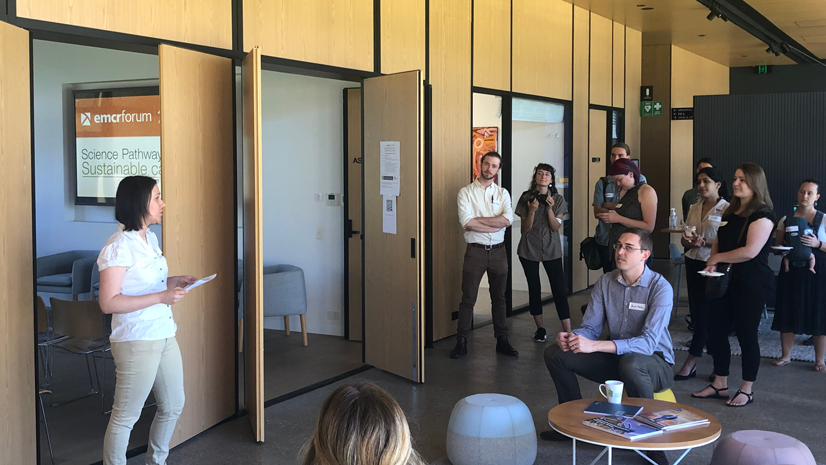Chair Curtin University EMCR Network Steering Committee
@drjuliaeaston
2022 Chair Australian Academy of Science EMCR Executive Committee, WA Hub Coordinator
@raffademichelis
Vice-Chair Curtin University EMCR Network Steering Committee
@PersonalityPat

The key challenges for EMCRs are nationally ubiquitous and while similar in focus to those 15 years ago, they have significantly intensified, as highlighted in discussions at the Science Pathways 2021: Sustainable Careers conference, held in November 2021 by the EMCR Forum of the Australian Academy of Science.
These challenges include:
Meanwhile, tenured academic roles have not increased in line with the number of PhDs awarded (it is estimated only 0.45% of PhD graduates are likely to become level E professors) and awareness of alternative career pathways is limited or discounted. Within academia, those EMCRs who find a job are typically employed on fixed-term contracts that are contingent on research grants; while many who leave the university system grieve the loss of their academic role.
To improve career opportunities, EMCRs were advised by the Chief Scientist, Dr Cathy Foley, to build their networks as wide as possible; join their professional society; and learn to communicate well (for example, be ready with their ‘elevator’ pitch to technical or general audiences). Throughout the conference, touching on several sub-topics within the broader theme of career sustainability, the importance of networking and communication skills was repeatedly highlighted. For example, according to Professional Scientists Australia, there are 1 in 173 chances of receiving a job offer through a job application, but 1 in 7 through networking. This is because, amongst other factors, many STEM jobs are not officially advertised.
To capitalise on and complement the Science Pathways launch event, EMCRs from across Western Australia were invited to an in-person WA hub event on the first day, sponsored by Curtin University and supported by the Forrest Foundation. It was organised by the only WA-based member of the Forum’s Executive Committee, Dr Raffaella Demichelis, with input from the Curtin EMCR Network Steering Committee, Dr Jacob Martin (Forrest Fellow at Curtin University) and Dr Kimberley Wang UWA EMCR Forum Representative). The WA hub enabled those gathered to engage en masse with the online national conference, enjoy a local networking breakfast and participate in the panel discussion, ‘What it is being an EMCR in Western Australia’.
The EMCR community in WA is large but somewhat isolated from the rest of the country, not only geographically but also temporally. And while most Perth-based academics will work at more than one university over the course of their career, they seem less likely than academics on the East coast to relocate to other states/territories for a research role. Yet the needs of EMCRs, including professional development, mentoring, training, networking and job security, are universal, regardless of location, employer or research area. As with many national programs, training, professional development and networking events are usually held on the East coast and scheduled to suit the East-coast audience. Locally, networking opportunities have tended to be ad hoc, informal, and hosted by individual organisations or discipline areas.
In recent times, there has been a significant, positive shift in the development of formalised EMCR networks in WA. This is most likely driven by the uncertainty in the university sector, the sense of isolation and demand for professional development and support. The maturities of WA-based university EMCR networks vary. Established in 2017, Edith Cowan University’s EMCR network is relatively mature, with a steering committee of 16 researchers and 250 members. Curtin’s steering committee was established in March 2021 and comprises 16 representatives and 160 members. The University of Western Australia has several discipline-based EMCR groups, including in law, chemistry and health, and has previously facilitated an ECR network. Murdoch University and The University of Notre Dame Australia lack formal EMCR programs.
Over the past 12 months, the more informal WA EMCR network has engaged well nationally but this has been at a significant time-cost to the volunteers involved. This is a common problem for EMCRs engaged in equity, diversity and support initiatives, who invest a significant amount of their personal time into invisible and yet vital causes. There is a willingness to collaborate and share knowledge, and establishing a formal WA EMCR group, with one or two representatives from each university, is under consideration.
The nature of WA’s EMCR environment means that a collaborative approach to supporting EMCRs should benefit all WA universities as well as WA government and industry, since this can facilitate career transition, collaboration and skills mobility between these three sectors. Given that existing and emerging EMCR networks in WA are driven by committed and passionate early- and mid-career researchers in a volunteer (and often uncredited) capacity, the support of DVCRs and line-managers will remain essential.

© 2025 Australian Academy of Science